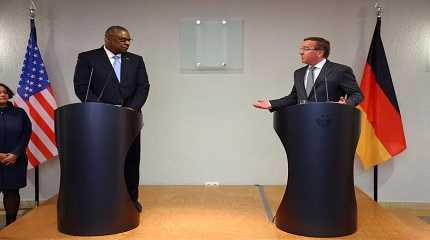
KYIV/BERLIN, Jan 19 (Reuters) - Western allies pledged billions of dollars in new weapons for Ukraine on Thursday, but the big question of whether to send heavy tanks remained unanswered, with Berlin yet to signal whether it would lift a veto.
Fearing winter will give Russian forces time to regroup and unleash a major attack, Ukraine is pushing for German-made Leopard battle tanks, which are held by an array of NATO nations but whose transfer to Ukraine requires Germany's approval.
A German government source said Berlin would lift its objections if Washington sends its own Abrams tanks.
German Chancellor Olaf Scholz, a Social Democrat, has been reluctant to send weapons seen as provoking Moscow. Many of Berlin's Western allies say that concern is misplaced, with Russia already fully committed to war.
The two countries tried to resolve the stand-off as U.S. Defense Secretary Lloyd Austin and the new German Defence Minister Boris Pistorius met in Berlin. But there was no word on whether they had made progress ahead of a meeting of dozens of allies on Friday at Ramstein, Washington's main European air base.
Ukrainian President Volodymyr Zelenskiy made thinly disguised criticism of Germany for its stance on tanks.
"'I am powerful in Europe, I will help if someone else outside of Europe will also help.' It seems to me that this is not a very correct strategy," he said.
The Ramstein meeting is billed as a chance for the West to give Ukraine what it needs to defeat Russia in 2023 and countries including Canada, the Netherlands and Sweden have already announced armoured vehicles and air defences.
But Kyiv says it needs heavy tanks to fend off Russian assaults and recapture occupied land.
"We have no time, the world does not have this time," Andriy Yermak, head of the Ukrainian presidential administration, wrote on Telegram on Thursday.
"The question of tanks for Ukraine must be closed as soon as possible," he said. "We are paying for the slowness with the lives of our Ukrainian people. It shouldn't be like that."
Berlin has so far blocked allies from sending its Leopard 2 tanks, workhorse of militaries across Europe. Washington and many Western allies say the Leopards - which Germany made in the thousands during the Cold War - are the only suitable option available in big enough numbers.
U.S. officials say they have no plans yet to send the Abrams, which runs on powerful turbine engines seen as using too much fuel for Kyiv's strained logistics system to supply at the front.




